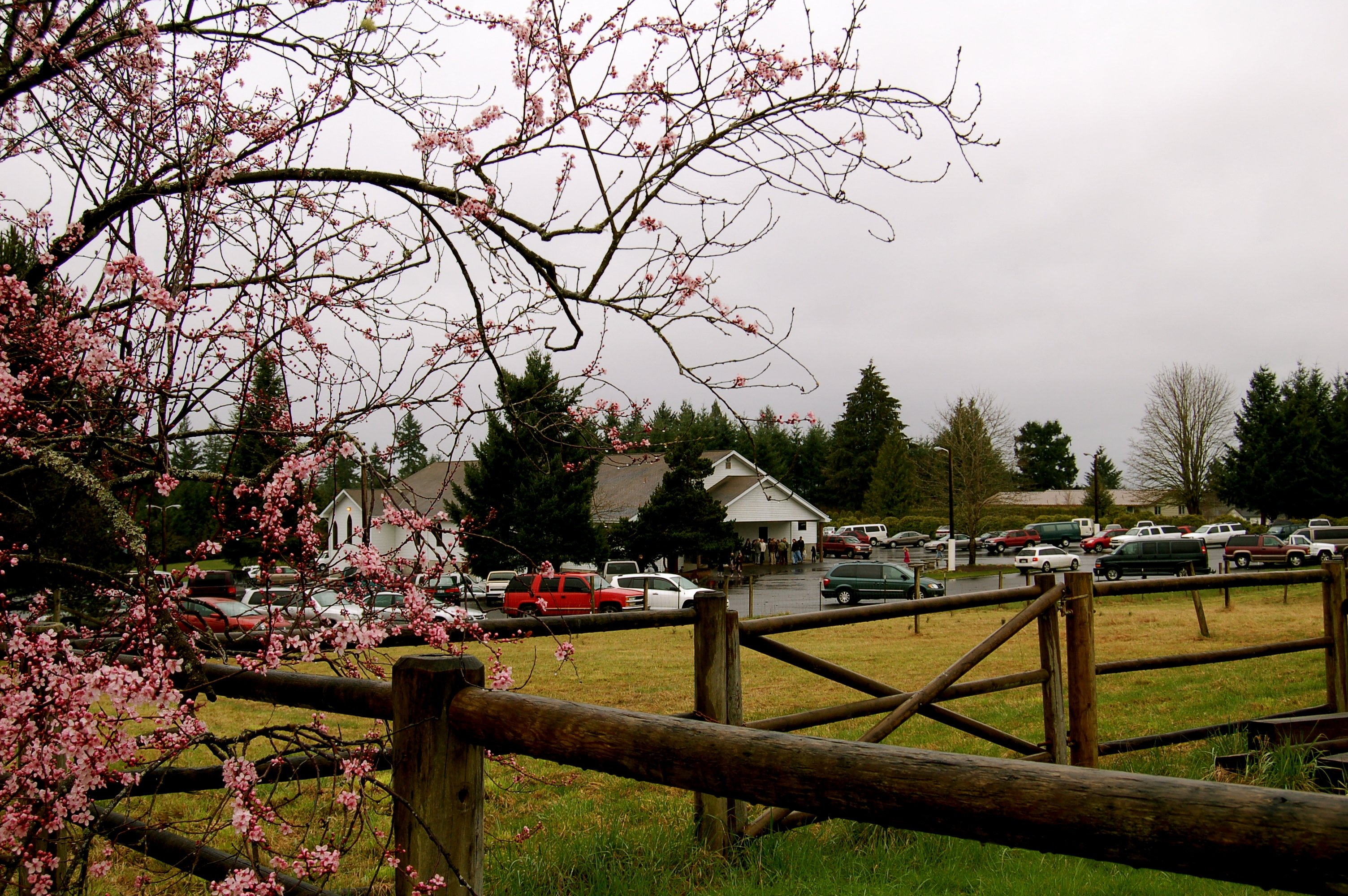
It’s been a quiet week in Brush Prairie, Washington. The last of the snow finally disappeared from the shaded North sides of the old barns, leaving the ground spongy and wet and making room for the crocuses and daffodils to poke their heads up tentatively like doughboys rising out of a foxhole. The days are finally getting longer, which means that the kids of Hockinson—twin city of Brush Prairie (pop. 6,157 and 2,858 respectively)—are getting up earlier to flick their Wii controllers about or to even venture outside to tromp around in massive snowmelt mud puddles while wearing the $75 Nike Air Lebrons they’d gotten for Christmas. After a long winter, the 10:30 Sunday service at the Hockinson Apostolic Lutheran Church seemed less like an early morning chore than as good a place as any to digest a sausage and pancake breakfast and procrastinate on replacing the water pump in the work van.
We drove out to visit this church because we’d heard about its female members’ unusual hairstyles—women with extravagantly long hair pulled up into buns, for whom lipstick is an abomination. But these were not exactly the Old Believers we’d hoped to see. They might more accurately be described as New (or Newish) Believers, people with one foot in the Old Church and, if they are men, the other planted on the gas pedal of their Ford F-350 pickup, which they bought for utility and not status, but which will nevertheless bring a tear to their eyes when it gets its first scratch. That is, if they cried. Which they don’t.
Most of Hockinson’s Apostolic Lutherans arrived here from Finland, by way of a generation or two spent in in Minnesota or Wisconsin.
The church is a massive, barnlike structure, built for economy and simplicity. When we walked in the front door, we were met with a tumult of kids, kids, kids, everywhere, munchkin-like gangs of them roving about the foyer, knots of awkward middle-schoolers in the corners avoiding eye contact with the opposite sex and babies strapped to their mothers’ sides.
Older teens huddled in the balcony, clinging to the last remnants of their youth and sense of irony, because by this time next year they will be married and, with luck, have the first of many children of their own.

At the beginning of the sermon, Pastor Ron Holmgren ascended the long staircase to an incongruously lofty pulpit that towered above the rest of the congregation, its height apparently designed to accommodate a visiting dignitary, maybe even Christ Himself. But the pastor, in his grey tweed jacket, black rayon necktie and the white shirt his wife had starched for him that morning looked like a speck at that elevation, swallowed up by its mass of blonde wood paneling, and as out of place as Donald Trump at a food stamp office. Such a noble place for a humble man of God, who had stayed up late the night before, preparing his sermon on the fourth chapter of John, the one about the Samaritan woman at the well:
5 Then cometh he to a city of Samaria, which is called Sychar, near to the parcel of ground that Jacob gave to his son Joseph.
6 Now Jacob’s well was there. Jesus therefore, being wearied with his journey, sat thus on the well: and it was about the sixth hour.
7 There cometh a woman of Samaria to draw water: Jesus saith unto her, “Give me to drink.”
8 (For his disciples were gone away unto the city to buy meat.)
9 Then saith the woman of Samaria unto him, “How is it that thou, being a Jew, askest drink of me, which am a woman of Samaria?” for the Jews have no dealings with the Samaritans.”
The Jews and the Samaritans had a long history of prejudice and mutual distrust. Among Jesus’ miracles, one of the greatest, apparently, was his ability to bridge that cultural divide. In application of its lesson, Pastor Holmgren admitted, “I’m not comfortable with other cultures, other races. It’s a sad reality.” Judging by the monochromatically Caucasian church membership, he couldn’t be getting much practice in Hockinson, but his tone of resignation suggested that he wasn’t much inclined to do anything about it either way. He soldiered on:
16 Jesus saith unto her, “Go, call thy husband, and come hither.”
17 The woman answered and said, “I have no husband.” Jesus said unto her, “Thou hast well said, I have no husband:
18 For thou hast had five husbands; and he whom thou now hast is not thy husband: in that saidst thou truly.”
In other words, the Samaritan woman was living in sin. Kind of like Amanda and me. Not that it felt weird at all. Just different.
And so his sermon droned on, occasionally slipping like a loose gear into the “thees” and “thous” of King James’ archaic English. If thou everest find thyself suffering from insomnia, loggest thou into Hockinson Apostolic’s website and play one of Pastor Holmgren’s sermons.
The man is a human barbiturate, a preacher whose glacial pace and lengthy pauses are perfectly timed to induce slumber.
Like their Old Church brethren, these Lutherans place a high value on procreation. Members aim to give birth to an apostolically numbered twelve children, though some fall short, accepting God’s will in the matter of head count. By our guess the children outnumber the adults in this congregation by a factor of four to one. Pastor Holmgren’s sermon was couched in the din of gurgling, fidgeting, whispering and occasionally wailing children. It was a tapestry of schoolyard sounds, not unpleasant, really, as one squeal would cancel out a squawk on the other side of the hall until the net effect could be compared to the drone of New York City traffic.
Sunday School at this church takes place at 9:30, before the morning service, which is probably for the best. The parents would otherwise find themselves in a mostly empty room with only their fellow adults and suffer a collective anxiety attack. Thus, the kids sit in the main auditorium and are subjected to Pastor Holmgren’s ramblings right alongside their parents. No doubt the ordeal brings families together more than anything the pastor himself could say.
As well-behaved Lutherans, no one was sleeping of course, but no one seemed to be paying deep attention, either. My sense was that the congregation was simply waiting patiently for the sermon to end. They seemed to be in the sort of trance you enter while standing in an airport security line. They were in standby mode.

Apostolic Lutherans are the quintessential salt of the earth. The men do honest, hard work with their hands. On Sundays they scrub their faces and shave carefully, but no amount of scouring will remove the dirt from under their fingernails or from within the dry cracks in their palms, which, though they feel like sandpaper, deliver firm, well-schooled handshakes.
In other parts of the country, you’re expected to change marriage mates two or three times over the course of your life if you bother to get married at all, but Apostolic Lutherans marry at 19 or so, in full confidence that they and their dozen children will join them in celebrating their silver anniversary. They change careers even less frequently, handing their septic tank replacement services and farmland down from generation to generation, like their eye color or their sensitivity to strong flavors.
These are people who keep to themselves, who have learned over generations of small town life not to pry. They show personal interest only obliquely and always with an elliptical escape clause. After the service was over, several friendly members introduced themselves. “Do you live nearby, or…?” “Are you considering joining our church, or…?” “Do you have any children, or…?” “Or what?” I kept wanting to ask, but I can avoid intimacy like the best of them myself.
To these Lutherans we were as foreign as Samaritans. That said, they are also Christians. If we’d asked, they would have given us a glass of water. They might even let us join their church. But it would have been a while before they accepted us as their own. Maybe 10 or 12 years, just to make sure. We were the Samaritan woman—exotic, foreign and tainted with worldly pagan-ness.
Well, that’s the news from Hockinson Apostolic Church, where the women are strong, the men are good looking and the children are being taught to reproduce like rabbits.


